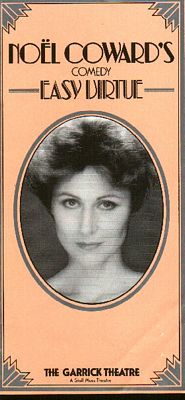Venue: Garrick 1988
Company: King's Head Islington
Director: Tim Luscombe


A small prize awaits anyone who can spot a couple of appreciable differences between the country house dance at which NoŽl Coward's Easy Virtue reaches its climax and the average Yuppie party. I issue this challenge in the almost complete certainty that I shall not have to part with any hard-earned cash because of the times in which we find ourselves. Has there ever been a period in which such overweening greed among the young - and the cash by the wheelbarrow to satisfy it - coincided with an era so lacking in style of its own. The result is a wholesale borrowing of the design, style and manners of other decades, most notably the twenties and fifties. And as the financial elite of modern youth climbs into evening dress, flicks its mind into neutral and sets off on another round of braying merriment, the twenties and the eighties become all but indistinguishable. There is even a convenient air of moral ambiguity; in the twenties a hangover from the Victorians, in the eighties a by-product of AIDS.
Which leaves Easy Virtue, revived after a gap of 63 years, in an odd position - too contemporary to be regarded purely as a theatrical curiosity but insufficiently rounded to be viewed as a valuable social commentary. The familiar theme is the conflict between that combination of intellect and passion which Coward found so appealing and the stilted, hypocritical post-Victorian mores of the twenties. A middle class family has an entire summerís tennis ruined by the more pressing task of rejecting the woman of the world, Jane How full of languid angst, who has married the son of the house.
Even by Cowardís standards, it is a sharp piece, crammed with one-liners in the style of a quick-fire comedy act. But in the way that some comedians use the machine-gun quip tactics to avoid the inconvenience of establishing a rapport with the audience, Cowardís dramatic approach in Easy Virtue seems cursory, bordering on off-hand. He takes the shortest route from cold start to soapbox, delivers an undistinguished sermon in Act Two and then tails off as if suddenly remembering a pressing engagement elsewhere. The single character, Ronnie Stevensí retired philanderer Colonel Whittaker, with a vital role to play in the play's conclusion is squandered as if the hurried playwright simply forgot his existence. The impression is that the play peaks too early and then tails off into a dull whimper, not so much because life itself is inconclusive as because Coward lost interest.
The attention, not to mention the massive 19-strong cast, lavished on this flawed work, together with the caricature playing of most of the cast, most notably Avril Angers, Miranda Kingsley and Lois Harvey, suggests that director Tim Luscombe is pitching Easy Virtue as a period curiosity.